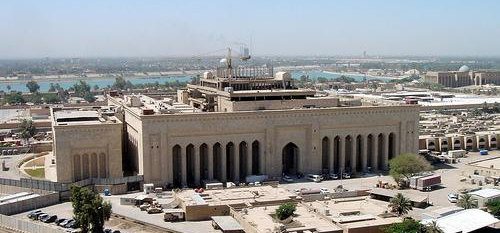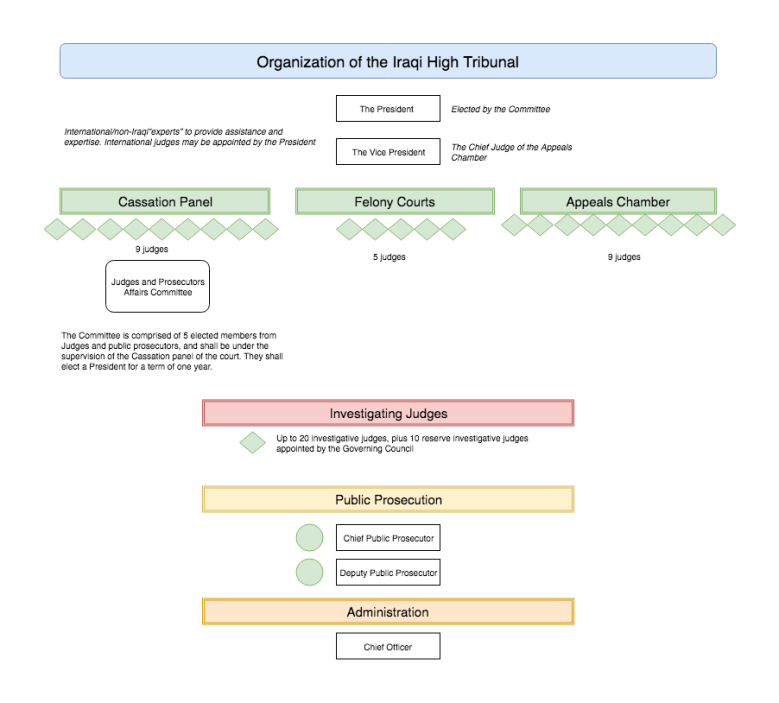
The Iraqi High Tribunal operated from 2005 – 2006.
Founding Documents
- On December 10, 2003, the US-appointed Iraqi Governing Council approved a statute establishing the Iraqi Special Tribunal for Crimes Against Humanity. Ambassador L. Paul Bremer signed the statute into law on behalf of the Coalition Provisional Authority.
- In August 2005, the statute was revoked by the Transitional National Assembly of Iraq, and was replaced by an amended statute. The Law of the Supreme Iraqi Criminal Tribunal/Iraqi High Criminal Court Law was signed on October 18, 2005.
- The Rules of Procedure and Evidence are an amended version of Iraq’s pre-existing Rules of Procedure and Evidence, and some of the Tribunal’s legal jurisdiction comes from the Iraqi Criminal Procedure Code of 1971.
Jurisdiction
The Iraqi High Tribunal was established to try Iraqi nationals or Iraqi residents accused of genocide, crimes against humanity, war crimes, or other serious crimes committed between July 17, 1968 and May 1, 2003. However, it was primarily intended to prosecute Saddam Hussein and members of the Ba’ath party.
Article 11 of the High Criminal Court Law defines the court’s jurisdiction over the crime of genocide in accordance with the Convention on the Prevention and Punishment of the Crime of Genocide, ratified by Iraq on January 20, 1959.
Article 12 of the High Criminal Court Law defines the court’s jurisdiction over crimes against humanity, when committed as part of a widespread or systematic attack directed against any civilian population. The Law states that crimes against humanity also include sexual violence.
Article 13 of the High Criminal Court Law defines the court’s jurisdiction over war crimes, referring to:
- Grave breaches of the Geneva Conventions of 12 August 1949.
- Other serious violations of the laws and customs applicable in international armed conflicts, within the established framework of international law.
- In the case of an armed conflict, war crimes committed against persons taking no active part in the hostilities.
- Other serious violations of the laws and customs of war applicable in armed conflict not of an international character.
Article 14 of the High Criminal Court Law defines the court’s jurisdiction over violations of Iraqi laws.
- Interference in the affairs of the judiciary or attempting to influence its functioning.
- Squandering of national resources, pursuant to Article 2(g) of the Punishment of Conspirators against Public Safety and Corrupters of the System of Governance Law 7 of 1958.
- The abuse of position and the pursuit of policies that have almost led to the threat of war in accordance with Article 1 of Law 7 of 1958.
- If the Tribunal finds that the special element of any of the crimes stipulated in Articles 11, 12 and 13 of this Law is missing, and establishes that the act involved constitutes a crime punishable under the Penal Code or any other penal law at the time of its commission, the Tribunal shall be competent to hear the case.
The Iraqi High Tribunal and the national courts shall have concurrent jurisdiction to prosecute persons accused of the crimes prescribed in Article 14, but the Tribunal will have primacy over all other Iraqi courts with respect to its jurisdiction over crimes prescribed in Articles 11, 12, and 13 of the Law.
Status of Cases
- On November 5, 2006, Saddam Hussein was convicted of crimes against humanity and sentenced to death by hanging for the July 1982 massacre of 148 Shiites from Dujail, in retaliation for an assassination attempt. He was hanged on December 30, 2006.
- Other defendants in the Dujail trial:
- Barzan Ibrahim al-Tikriti, Saddam Hussein’s half-brother and former chief of intelligence – sentenced to death and executed by hanging. He was executed on January 15, 2007.
- Former Vice President Taha Yassin Ramadan (alias Tah al-Jazrawi) – sentenced to death and executed by hanging. He was executed on March 20, 2007.
- Former Chief Judge Awad Hamed al-Bandar – sentenced to death and executed by hanging. He was executed on January 15, 2007.
- Abdullah Kadhim Ruwaid (alias Mizher) – sentenced to 15 years imprisonment.
- Abdullah Kadhim Ruwayid al-Mashaikh – sentenced to 15 years imprisonment.
- Ali Dayem Ali al-Subaidi – sentenced to 15 years imprisonment.
- Mohammed Azzawi Ali al-Marsumi – acquitted due to lack of evidence.
- Al-Anfal trial: In June 2006, the Tribunal announced that Saddam Hussein and his 6 co-defendants would be tried for Al-Anfal Campaign against the Kurds in 1988 and the suppression of the 1991 Kurdish uprising. The chief prosecutor argued Iraqi forces killed up to 182,000 civilians during the campaign, leaving hundreds of thousands forcibly displaced, and repeatedly using chemical weapons. The Al-Anfal trial began on August 21, 2006. The defendants were:
- Saddam Hussein
- Ali Hassan al-Majid (alias Chemical Ali) – sentenced to death on June 24, 2007.
- Sultan Hashim Ahmad (alias Sultan Ahmad) – sentenced to death on June 24, 2007.
- Hussein Rashid al-Tikriti (alias Hussein Rashid) – sentenced to death on June 24, 2007.
- Sabir Abd al-Aziz al-Douri (alias al-Douri) – sentenced to multiple life sentences.
- Farhan Mutlaq al-Jaburi – sentenced to multiple life sentences.
- Tahir Tawfiq al-Anani – acquitted due to lack of evidence.
Literature Review
Structure
